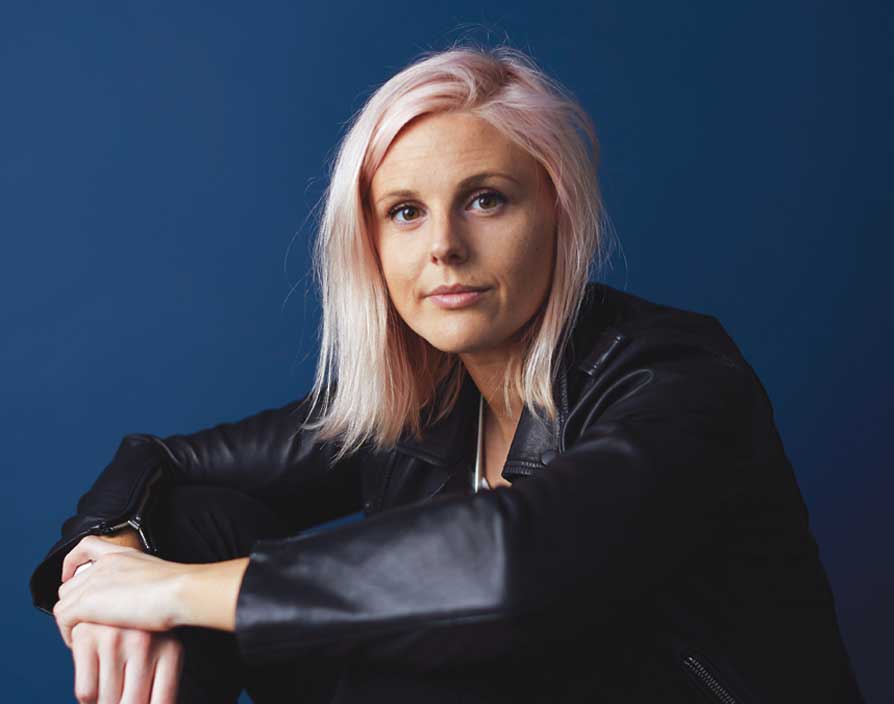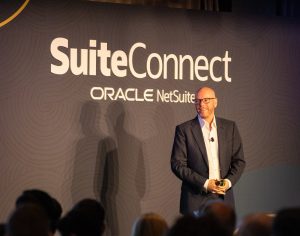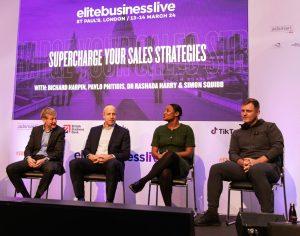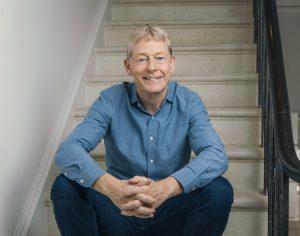Robyn Exton was on a mission. Outfitted with pink fluorescent tights, a white vest and a holster around her waist with a bottle of liquor dangling from each hip, she dashed between groups of women in nightclubs. Making them lean in to hear her over the roar of the music, Exton said: “I have a new app called Dattch and if you sign up now you’ll get a free shot of tequila.”
Short for “date catch”, Dattch was the pre-cursor to Her, the dating app for queer, bisexual and gay women that is now matching people across the globe. Much of that success can be attributed to Exton’s nightly escapades in 2013, trading shots for signups. “We got our first 1,000 people that way,” she says.
If you’re shocked by her no muss, no fuss approach to marketing, keep in mind that Exton is far from your average tech entrepreneur. “You hear a lot from founders who say they’ve always run a business or that entrepreneurship runs in their families – that’s not me at all,” she says. In fact, up until a few years ago, Exton worked at the marketing agency Calling Brands, which bestowed her with her first peek behind the curtains of the dating industry. “One of my clients was a dating business and I got really excited about the sector,” says Exton.
However, the idea to launch a dating app didn’t come to her until a Sunday she spent at the pub. “My friend had just split up with her girlfriend,” explains Exton. Wanting to get back into the dating game, Exton’s friend asked her what dating sites she was using. As the conversation progressed, it became clear that the range of quality dating sites and apps for lesbians wasn’t just limited; it was non-existent.
While straight people swiped away on Tinder and gay men matched on Grindr, there wasn’t an app designed for women who were attracted to women. “Queer women had no real options,” says Exton. Tired of seeing her friends make do with subpar matchmaking communities, she set out to improve gay women’s dreadful digital dating experiences. “I wanted to make something better and more relevant to women that would actually mean something to them,” she says.

Her first step towards launching the app was to immerse herself in the London tech scene. “I started to attend events and become more involved,” she says. As a part of her efforts to sharpen her technological know-how, Exton signed up for an eight-week coding course at the General Assembly, the tech school. She also took on freelancers to supplement her own knowledge and help her out with early versions of the app.
However, signing up techies doesn’t come cheap: Exton had to inject some serious capital in the business. In lieu of investors, she bootstrapped the startup by ploughing in £10,000 of her own savings, moving back in with her dad, taking an extra job at a pub and selling many of her possessions. But these sacrifices eventually paid off when the team finished the first version of Dattch. “I quit my job the day we submitted it to Apple,” she says.
Her first infusion of real money came in March 2013 when Dattch joined Wayra, Telefónica’s startup accelerator. “The initial investment was really important to me because I could hire full-time team members,” she says. “That made a huge difference.” But the startup didn’t just benefit from the ¤40,000 awarded by Wayra: it also benefitted from joining a community of other startups. “You were all doing similar things, you built great friendships and there was a fantastic knowledge exchange,” she says.
Having secured funding and technological knowhow, Exton was left with the challenge of marketing the app, which is how she found herself frequenting London nightclubs slinging shots of tequila in exchange for signups. But this wasn’t the only trick she had up her sleeve. “We used to go to pride festivals where they use those gross porta-potties that always run out of toilet paper,” explains Exton. Not one to miss an opportunity when it presents itself, she simply stapled flyers on toilet paper rolls and handed them out in the queues. “Really glamorous stuff,” she laughs.
However, while she now had some money and a full-time team, the dating app didn’t take off at first. “In the first six months, it had very little response, engagement and pick-up,” she said. The problem was that the app was very similar to the way male-oriented dating apps like Grindr worked, focusing on clear pictures, fast meet-up times, short interactions and making it easy to form quick judgements. “It’s the total opposite of the type of experience women are looking for,” says Exton. “They want to browse a lot more content, read more information and chat for a longer time before meeting up.”
The team noticed something else too: women didn’t just use the app for dating. In fact, a lot of the users were in relationships and used it to find out what was happening on the gay scene. More often than not, people would sign up to discover local events, read news, meet new friends and get advice. Catering to the way members of the community were using Dattch, Exton’s team redesigned and relaunched the platform as Her, transforming it from a simple matchmaking app to something greater. “It became more of a way to connect with the wider community than just helping people meet up one-on-one,” says Exton.
The rebrand coincided with Her’s series B round during which the app secured $1m funding from investors such as Alexis Ohanian, co-founder of Reddit, Garry Tan, co-founder of Posterous, and the British serial entrepreneur Michael Birch. About the same time, Her went live in the US and Exton was given the opportunity to pitch the app at an American conference. “The reaction was phenomenal,” says Exton. “To be fair, I was pitching it at Lesbians Who Tech, so it couldn’t have been a more suitable group of people.”
But it wasn’t just the venue: Americans seemed more switched on to the idea than Exton’s countrymen had been. “British people are really sceptical,” she says. “But the Americans were like ‘I can’t wait to download this’.” The overwhelmingly positive response combined with a desire to be close to its new American investors made deciding Her’s next step easy: the team decided to relocate to the US. So that’s how in the spring of 2015, Exton packed her bags and ventured across the pond.
Having settled into the new headquarters in San Francisco, the expat and her team are now gearing up for the next stage. For starters, Exton plans to release a premium membership at the end of the autumn with new features. What those will be still remains to be seen but Her is not stopping there.
Today, the app has over a million users and is available in the UK, the US, Canada, Brazil, Japan, Australia, Mexico, Thailand, Germany, South Africa and the Netherlands. But Exton plans to expand the business even further. “Next we’re focusing on growing internationally and building our community across the world,” she says.
When Exton does decide to grow the app, more women will be able to get access to a community that’s already changing the lives of thousands of people, something evidenced by the scores of positive stories Her’s users have shared with the company. “We have a wall full of them,” she says. Each story is a testament to the fact that Her is more than a hook-up tool; it’s become a way for gay women to feel accepted for who they are. “Sadly, a lot of people won’t get acceptance from their families, friends or communities,” says Exton. “But we can give them that by providing a community that understands them.”
The first time she realised the impact the app was having on women’s lives was a few years ago. “A girl came up to me in a pub in London and said she’d been sleeping with her roommate,” says Exton. The girl explained to Exton that she hadn’t been sure whether she was gay or not but after joining Her she realised that it didn’t matter: here was a group of people who accepted her no matter what. “It was incredible,” she concludes. “I’ll always remember that story.” ![]()
Share via:


















































